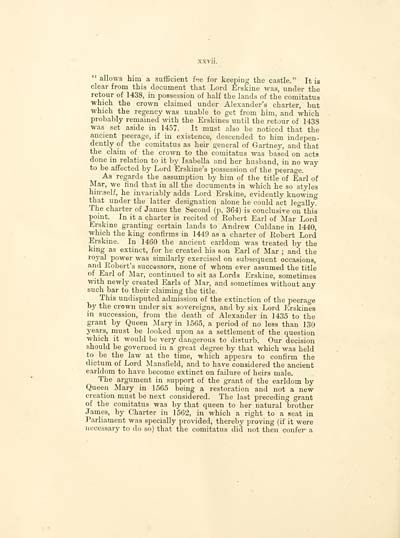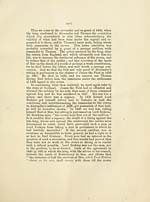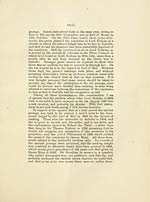Paper on the Mar peerage
(56) Page xxvii
Download files
Complete book:
Individual page:
Thumbnail gallery: Grid view | List view

" allows him a sufficient fee for keeping the castle." It is
clear from this document that Lord Erskine was, under the
retour of 1438, in possession of half the lauds of the comitatus
which the crown claimed under Alexander's charter, but
which the regency was unable to get from him, and which
probably remained with the Erskines until the retour of 1438
was set aside in 1457. It must also be noticed that the
ancient peerage, if in existence, descended to him indepen-
dently of the comitatus as heir general of Gartney, and that
the claim of the crown to the comitatus was based on acts
done in relation to it by Isabella and her husband, in no way
to be affected by Lord Erskine's possession of the peerage.
As regards the assumption by him of the title of Earl of
Mar, we rind that iu all the documents in which he so styles
himself, he invariably adds Lord Erskine, evidently knowing
that under the latter designation alone he could act legally.
The charter of James the Second (p. 364) is conclusive on this
point. In it a charter is recited of Robert Earl of Mar Lord
Erskine granting certain lands to Andrew Culdane in 1440,
which the king confirms in 1449 as a charter of Robert Lord
Erskine. In 1460 the ancient earldom was treated by the
king as extinct, for he created his son Earl of Mar ; and the
royal power was similarly exercised on subsequent occasions,
and Robert's successors, none of whom ever assumed the title
of Earl of Mar, continued to sit as Lords Erskine, sometimes
with newly created Earls of Mar, and sometimes without any
such bar to their claiming the title.
This undisputed admission of the extinction of the peerage
by the crown under six sovereigns, and by six Lord Erskines
in succession, from the death of Alexander in 1435 to the
grant by Queen Mary in 1565, a period of no less than 130
years, must be looked upon as a settlement of the question
which it would be very dangerous to disturb. Our decision
should be governed in a great degree by that which was held
to be the law at the time, which appears to confirm the
dictum of Lord Mansfield, and to have considered the ancient
earldom to have become extinct on failure of heirs male.
The argument iu support of the grant of the earldom by
Queen Mary in 1565 being a restoration and not a new
creation must be next considered. The last preceding grant
of the comitatus was by that queen to her natural brother
James, by Charter in 1562, in which a right to a seat in
Parliament was specially provided, thereby proving (if it were
necessary to do so) that the comitatus did not then confer a
clear from this document that Lord Erskine was, under the
retour of 1438, in possession of half the lauds of the comitatus
which the crown claimed under Alexander's charter, but
which the regency was unable to get from him, and which
probably remained with the Erskines until the retour of 1438
was set aside in 1457. It must also be noticed that the
ancient peerage, if in existence, descended to him indepen-
dently of the comitatus as heir general of Gartney, and that
the claim of the crown to the comitatus was based on acts
done in relation to it by Isabella and her husband, in no way
to be affected by Lord Erskine's possession of the peerage.
As regards the assumption by him of the title of Earl of
Mar, we rind that iu all the documents in which he so styles
himself, he invariably adds Lord Erskine, evidently knowing
that under the latter designation alone he could act legally.
The charter of James the Second (p. 364) is conclusive on this
point. In it a charter is recited of Robert Earl of Mar Lord
Erskine granting certain lands to Andrew Culdane in 1440,
which the king confirms in 1449 as a charter of Robert Lord
Erskine. In 1460 the ancient earldom was treated by the
king as extinct, for he created his son Earl of Mar ; and the
royal power was similarly exercised on subsequent occasions,
and Robert's successors, none of whom ever assumed the title
of Earl of Mar, continued to sit as Lords Erskine, sometimes
with newly created Earls of Mar, and sometimes without any
such bar to their claiming the title.
This undisputed admission of the extinction of the peerage
by the crown under six sovereigns, and by six Lord Erskines
in succession, from the death of Alexander in 1435 to the
grant by Queen Mary in 1565, a period of no less than 130
years, must be looked upon as a settlement of the question
which it would be very dangerous to disturb. Our decision
should be governed in a great degree by that which was held
to be the law at the time, which appears to confirm the
dictum of Lord Mansfield, and to have considered the ancient
earldom to have become extinct on failure of heirs male.
The argument iu support of the grant of the earldom by
Queen Mary in 1565 being a restoration and not a new
creation must be next considered. The last preceding grant
of the comitatus was by that queen to her natural brother
James, by Charter in 1562, in which a right to a seat in
Parliament was specially provided, thereby proving (if it were
necessary to do so) that the comitatus did not then confer a
Set display mode to:
![]() Universal Viewer |
Universal Viewer | ![]() Mirador |
Large image | Transcription
Mirador |
Large image | Transcription
Images and transcriptions on this page, including medium image downloads, may be used under the Creative Commons Attribution 4.0 International Licence unless otherwise stated. ![]()
| Histories of Scottish families > Paper on the Mar peerage > (56) Page xxvii |
|---|
| Permanent URL | https://digital.nls.uk/94944482 |
|---|
| Description | A selection of almost 400 printed items relating to the history of Scottish families, mostly dating from the 19th and early 20th centuries. Includes memoirs, genealogies and clan histories, with a few produced by emigrant families. The earliest family history goes back to AD 916. |
|---|

